Cantic 5-cube
| Truncated 5-demicube Cantic 5-cube | |
|---|---|
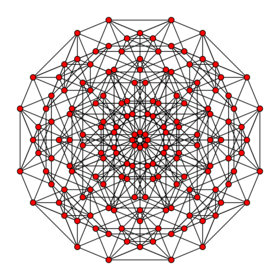 D5 Coxeter plane projection | |
| Type | uniform 5-polytope |
| Schläfli symbol | h2{4,3,3,3} t{3,32,1} |
| Coxeter-Dynkin diagram | |
| 4-faces | 42 total: 16 r{3,3,3} 16 t{3,3,3} 10 t{3,3,4} |
| Cells | 280 total: 80 {3,3} 120 t{3,3} 80 {3,4} |
| Faces | 640 total: 480 {3} 160 {6} |
| Edges | 560 |
| Vertices | 160 |
| Vertex figure |  ( )v{ }×{3} |
| Coxeter groups | D5, [32,1,1] |
| Properties | convex |
In geometry of five dimensions or higher, a cantic 5-cube, cantihalf 5-cube, truncated 5-demicube is a uniform 5-polytope, being a truncation of the 5-demicube. It has half the vertices of a cantellated 5-cube.
Cartesian coordinates
The Cartesian coordinates for the 160 vertices of a cantic 5-cube centered at the origin and edge length 6√2 are coordinate permutations:
- (±1,±1,±3,±3,±3)
with an odd number of plus signs.
Alternate names
- Cantic penteract, truncated demipenteract
- Truncated hemipenteract (thin) (Jonathan Bowers)[1]
Images
| Coxeter plane | B5 | |
|---|---|---|
| Graph | 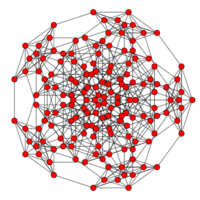
| |
| Dihedral symmetry | [10/2] | |
| Coxeter plane | D5 | D4 |
| Graph | 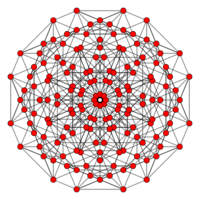
|
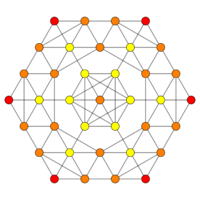
|
| Dihedral symmetry | [8] | [6] |
| Coxeter plane | D3 | A3 |
| Graph | 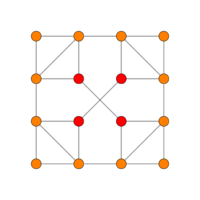
|
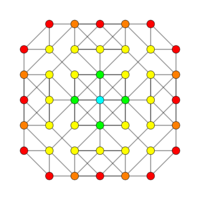
|
| Dihedral symmetry | [4] | [4] |
Related polytopes
It has half the vertices of the cantellated 5-cube, as compared here in the B5 Coxeter plane projections:
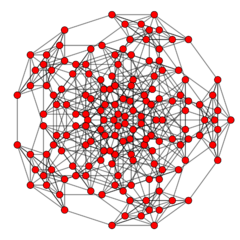 Cantic 5-cube |
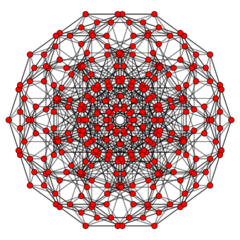 Cantellated 5-cube |
This polytope is based on the 5-demicube, a part of a dimensional family of uniform polytopes called demihypercubes for being alternation of the hypercube family.
There are 23 uniform 5-polytope that can be constructed from the D5 symmetry of the 5-demicube, of which are unique to this family, and 15 are shared within the 5-cube family.
Notes
- ↑ Klitzing, (x3x3o *b3o3o - thin)
References
- H.S.M. Coxeter:
- H.S.M. Coxeter, Regular Polytopes, 3rd Edition, Dover New York, 1973
- Kaleidoscopes: Selected Writings of H.S.M. Coxeter, edited by F. Arthur Sherk, Peter McMullen, Anthony C. Thompson, Asia Ivic Weiss, Wiley-Interscience Publication, 1995, ISBN:978-0-471-01003-6 [1]
- (Paper 22) H.S.M. Coxeter, Regular and Semi Regular Polytopes I, [Math. Zeit. 46 (1940) 380-407, MR 2,10]
- (Paper 23) H.S.M. Coxeter, Regular and Semi-Regular Polytopes II, [Math. Zeit. 188 (1985) 559-591]
- (Paper 24) H.S.M. Coxeter, Regular and Semi-Regular Polytopes III, [Math. Zeit. 200 (1988) 3-45]
- Norman Johnson Uniform Polytopes, Manuscript (1991)
- N.W. Johnson: The Theory of Uniform Polytopes and Honeycombs, Ph.D.
- Klitzing, Richard. "5D uniform polytopes (polytera) x3x3o *b3o3o - thin". https://bendwavy.org/klitzing/dimensions/polytera.htm.
External links
- Weisstein, Eric W.. "Hypercube". http://mathworld.wolfram.com/Hypercube.html.
- Polytopes of Various Dimensions
- Multi-dimensional Glossary
Fundamental convex regular and uniform polytopes in dimensions 2–10
| ||||||||||||
|---|---|---|---|---|---|---|---|---|---|---|---|---|
| Family | An | Bn | I2(p) / Dn | E6 / E7 / E8 / F4 / G2 | Hn | |||||||
| Regular polygon | Triangle | Square | p-gon | Hexagon | Pentagon | |||||||
| Uniform polyhedron | Tetrahedron | Octahedron • Cube | Demicube | Dodecahedron • Icosahedron | ||||||||
| Uniform 4-polytope | 5-cell | 16-cell • Tesseract | Demitesseract | 24-cell | 120-cell • 600-cell | |||||||
| Uniform 5-polytope | 5-simplex | 5-orthoplex • 5-cube | 5-demicube | |||||||||
| Uniform 6-polytope | 6-simplex | 6-orthoplex • 6-cube | 6-demicube | 122 • 221 | ||||||||
| Uniform 7-polytope | 7-simplex | 7-orthoplex • 7-cube | 7-demicube | 132 • 231 • 321 | ||||||||
| Uniform 8-polytope | 8-simplex | 8-orthoplex • 8-cube | 8-demicube | 142 • 241 • 421 | ||||||||
| Uniform 9-polytope | 9-simplex | 9-orthoplex • 9-cube | 9-demicube | |||||||||
| Uniform 10-polytope | 10-simplex | 10-orthoplex • 10-cube | 10-demicube | |||||||||
| Uniform n-polytope | n-simplex | n-orthoplex • n-cube | n-demicube | 1k2 • 2k1 • k21 | n-pentagonal polytope | |||||||
| Topics: Polytope families • Regular polytope • List of regular polytopes and compounds | ||||||||||||
 |

